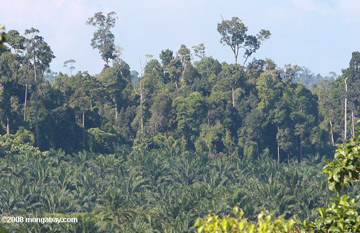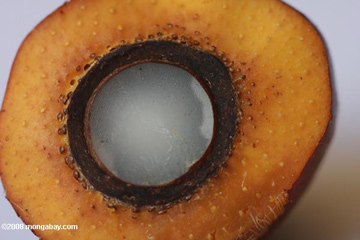Malaysia and Indonesia should establish “a joint council based in Europe and the United States” to boost the image of palm oil and counter criticism from environmental and human rights groups, a Malaysian minister told Malaysia state press.
Tun Dr Lim Keng Yaik, formerly the head of the Minister of Primary Industries (now the Plantation Industries and Commodities Ministry), said both countries should allocate funds to establish the council, which would be headed by “an articulate person” to attend forums organized by groups campaigning against damaging practices by the palm oil industry.
“The person must be prepared to debate with them based on well-researched facts and figures on our side,” Bernama quoted Lim as saying in a keynote address at the Second International Conference on the Future of Palm Oil Business 2010 in Kuala Lumpur Monday.

Oil palm plantation adjacent to tropical rainforest. |
“Malaysia and Indonesia as the main palm oil producers must come to the forefront to fight these threats. I am confident that we will win in the end because their campaigns are based on half-truths and sometimes outright lies.”
The palm oil industry has been criticized by local, national, and international groups for a number of ills including deforestation, pollution, social conflict, and poor labor practices. Industry bodies maintain these criticisms are unfounded and have been prompted by energy and agricultural interests in the United States and Europe seeking to protect their markets from palm oil, which is among the cheapest sources of vegetable oil.
“Our success in global markets due to a superior and less costly product prompted Western competitors and their trade and labour union allies to react. They would like to block our product from their markets if possible,” said Lim.
“So, we are able to sell our goods freely, satisfying rising global demand in the process, at least for the time being.”

Oil palm fruit |
Lim’s language is similar to recent campaigns orchestrated by Alan Oxley, a former diplomat who has become a chief lobbyist for the palm oil and pulp and paper industries via his NGO World Growth International and his marketing firm, ITS Global. The campaign language (including typos) has also been adopted by the newly launched Consumer Alliance for Global Prosperity, a group that attacks U.S. companies that have implemented environmental criteria in their paper sourcing policies, including Office Depot, Staples, Kimberly Clark, and Office Max (but oddly, not Walmart). The Consumer Alliance for Global Prosperity uses the same mailing list as World Growth International, but Andrew Langer, the spokesman for Consumers Alliance for Global Prosperity, has denied any link to Oxley and World Growth International.
Despite the campaign, some palm oil companies have implemented safeguards to minimize the impact of their operations, which once established, can be a highly productive source of vegetable oil that requires less land than other oilseeds.
Complaints with palm oil generally center around “new plantings” or expansion into forest areas and land contested by local communities, rather than existing plantations or estates established on non-forest land. However the conduct of “bad actors” tends to tarnish the entire palm oil industry, leaving it exposed to criticism.














